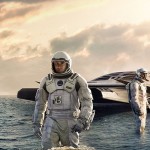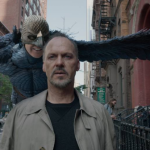
(Just before I sat down to write this review, I noted that my gracious host has already posted her assessment of this movie. In my very brief time as a critic, I’ve learned not to read other reviews prior to doing my own writing. So, after I post this, I’ll be curious to see where Rebecca’s and my thoughts overlap, and where they differ.)
Anyone participating in online film discussions quickly learns that director Christopher Nolan is a polarizing figure. Some quite vocally esteem him as this generation’s Steven Spielberg (or better), while others consider his movies to be full of sound and explosions, signifying nothing.
You can place me on the middling positive side of the Nolan Admire-o-Meter. His Batman films easily surpass all Marvel sagas or sci-fi caresses of Tom Cruise’s fragile ego. I’ve found this especially true when applying the repeat viewing test, even if the Batman trilogy’s efforts at social commentary end up muddled and borderline incoherent.
Nolan’s scripts, often co-written with his brother Jonathan, succeed far more when melding world creation (and yes, plenty of destruction) with the exploration of more intimate concepts. Even if it is about 20 minutes too long, I rank Inception as one of my favorite movies of the 21st Century. I consider this film both a visual feast and a potent meditation upon grieving and letting go of defunct relationships, as well as upon the ways in which we assign meaning and valence to memories.
While Interstellar works less well as a story than Inception (and it, too, could have benefitted from a trimming of 20-30 minutes of screen time), I give props to the Nolan brothers for this touching look at parent-child relationships and the endurance of their love, goodness, and power across space, time, and death itself.
Set in an unspecified future, Interstellar revolves around the character of Cooper (Matthew McConaughey). A widowed and thus single parent, Cooper lives with his father-in-law Donald (John Lithgow), his son Tom, and his daughter Murph. Once a NASA engineer and pilot, Cooper is now a farmer. Since the Earth is afflicted by the worldwide “Blight,” in which one crop at a time is dying off, more farmers are a necessity, while technical skills have mostly become a luxury.
Cooper is an exemplary dad, stoking his kids’ talents and curiosity, backing them up in conflict, and teaching them self-reliance and flexibility. Of his two offspring, Murph is more like her dad, with a stout intellect, tenacity, and scientific bent. She is more open to the supernatural and mystical, though, believing there are ghosts on the farm attempting to communicate.
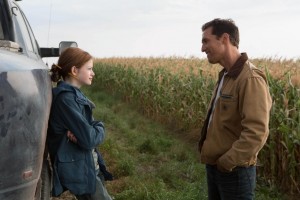
Cooper and Murph decode one of these ghostly messages, leading them to a top secret NASA installation, where they meet another father-daughter pair. Professor Brand (Michael Caine) and Amelia (Anne Hathaway) break the news that earth’s last surviving crop is also destined to fail, and they are thus spearheading a mission to find a new habitable world for humankind. Brand persuades Cooper to join this effort, who must then say agonizing goodbyes to his children, not knowing if they will ever see each other again.
Along with Gravity, we now have two movies in as many years imaginatively and effectively conveying the vertiginous thrill and danger of space travel. As such, Interstellar is definitely a film worth experiencing on a big screen. Nolan and his creative team terrifically conceptualize the look and feel of alien planets, a black hole, and a wormhole, among other grand spectacles. I love their backwards glance to the groundbreaking visuals of 2001: A Space Odyssey, as well as a wink at that film’s plot, courtesy of a nifty wisecracking robot on Cooper’s spacecraft. Admirable, too, is the soundtrack’s balancing of the silence of space with Hans Zimmer’s pipe organ-centric musical score (perhaps his best compositional effort since Inception).
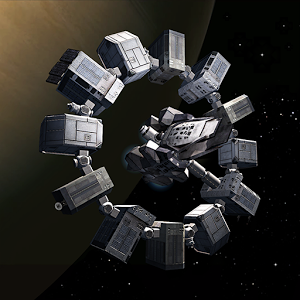
The acting is mostly praiseworthy as well, and the characters of Interstellar represent a leap forward for Nolan in bringing to life human beings rather than types. Matthew McConaughey and Jessica Chastain (as grownup Murph) are two of the best American actors working today, and they don’t let up in Interstellar. Lithgow and Caine turn in convincing performances, too, with Caine in particular exceeding his more lackadaisical efforts as Batman’s Alfred. Anne Hathaway has struck me as a rather wooden, unpersuasive actor of late, but here, she’s better than usual as Cooper’s co-traveler.
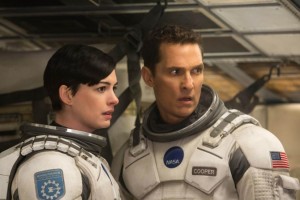
Where this movie stumbles is, first, in its deployment of some philosophical and pseudoscience gibberish. I can’t comment on the physics of this film (though no doubt Neil deGrasse Tyson will have a field day dissecting its missteps on his StarTalk podcast), but the evolutionary and ethical mumbo-jumbo near the end of Interstellar made me cringe. At least Nolan is on the side of the angels (metaphorically speaking, of course) in his dismissal of supernatural woo and on humanity’s need to take sole responsibility for solving its own problems.
Nolan needs even more absolution, however, for the Gordian knot of a storyline in Interstellar’s final 45 minutes. I consider myself an above-average close watcher of films, but I have zero idea how one spacecraft pilot disappeared, nor how one key character’s love interest suddenly popped up. At least the final moments provide an emotionally satisfying wrap, but I hope Nolan improves in the narrative clarity department on his next outing.
3.5 out of 5 stars
(Parents’ guide: Interstellar is appropriately rated PG-13 for some intense perilous action and brief strong language. I think the bigger issue for younger folk will be the sustainment of attention for 165 minutes. I’ll probably take my 17 year old to see this, while my younger teens will happily go and watch Big Hero 6.)

